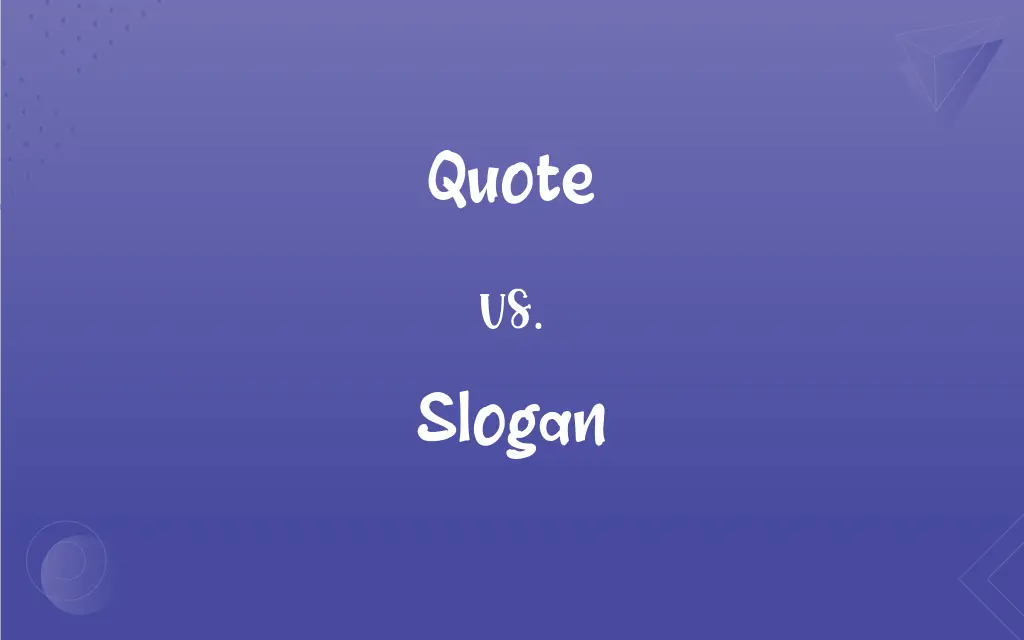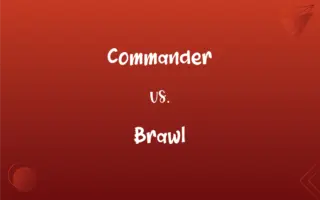Quote vs. Slogan: What's the Difference?
Edited by Aimie Carlson || By Harlon Moss || Updated on November 18, 2023
A quote is a direct repetition of someone else's words, while a slogan is a catchy phrase designed to convey a message or represent a brand or idea.

Key Differences
A quote is a verbatim excerpt from someone's speech or writing, reflecting their thoughts or opinions. In contrast, a slogan is a brief, memorable phrase used in advertising or by organizations to express a key message or value.
Quotes are often used to convey the wisdom, humor, or perspective of the original speaker or writer. On the other hand, slogans are crafted to be impactful and easily remembered, often used in marketing campaigns or political movements.
While a quote maintains the original context and meaning of the words as expressed by the original author or speaker, a slogan is designed to evoke emotions or prompt action, often independent of its creator's specific context.
Quotes are attributed to individuals and are respected for their authenticity and originality. Slogans, however, are typically created by groups or organizations and are more about persuasion and representation than authenticity.
In terms of usage, quotes are often cited in academic, journalistic, or personal contexts to support an argument or idea. Slogans, in contrast, are primarily used in public and commercial arenas to simplify complex ideas or values into a catchy phrase.
ADVERTISEMENT
Comparison Chart
Purpose
To accurately convey someone else's words or thoughts.
To create a memorable phrase that promotes a product, idea, or cause.
Originality
Originates from an individual's speech or writing.
Often created by a team for promotional purposes.
Context
Maintains the context and meaning of the original speaker/writer.
Context is less important; more about impact and recall.
Length
Can vary, often a sentence or two.
Typically very brief, a few words.
Usage
Academic, journalistic, personal.
Advertising, political, branding.
ADVERTISEMENT
Quote and Slogan Definitions
Quote
A quote is a direct repetition of someone's spoken or written words.
As Shakespeare said, To be, or not to be, that is the question.
Slogan
Political campaigns use slogans to encapsulate their messages.
His election slogan, Change We Can Believe In, was widely used.
Quote
Quotes are often cited to invoke the authority or credibility of the original speaker.
She began her essay with a quote from Maya Angelou to express resilience.
Slogan
Slogans can become synonymous with a brand or cause.
The anti-drug campaign's slogan, Just Say No, became iconic.
Quote
In financial terms, a quote represents the price of a stock or commodity.
The stock quote for Apple showed a significant rise this morning.
Slogan
Slogans are designed to be memorable and persuasive.
The environmental campaign used the slogan, Save Our Planet.
Quote
A quote can serve as evidence or illustration in a discussion.
In his speech, he used a quote from Lincoln to emphasize freedom.
Slogan
A slogan is a short, catchy phrase used in advertising or promotion.
Just Do It is a popular slogan for Nike.
Quote
A quote can be a memorable line from literature or media.
The famous movie quote, May the Force be with you, is widely recognized.
Slogan
A slogan often reflects the ethos or mission of a company or movement.
The fast-food chain's slogan, I'm Lovin' It, conveys enjoyment.
Quote
To repeat or copy (words from a source such as a book), usually with acknowledgment of the source
Quoted lines from Shakespeare in his lecture.
Quote
To repeat or copy the words of (a person or a book or other source)
Likes to quote Shakespeare when giving advice.
Quote
To cite or refer to for illustration or proof
Quoted statistics to show she was right.
FAQs
What makes a good slogan?
Being memorable and conveying a clear message.
Can quotes be used in advertising?
Yes, especially to endorse products or ideas.
What is a quote?
A repetition of someone's exact words.
How long is a typical quote?
It varies, but usually a sentence or two.
Are slogans always short?
Typically, yes, for easy recall.
Is it legal to use someone else's quote?
Generally, yes, but proper attribution is necessary.
What is a slogan?
A catchy phrase for advertising or representing ideas.
Can a slogan be a quote?
Rarely, but it's possible if the quote is catchy.
Do quotes need attribution?
Yes, to credit the original speaker or writer.
How are slogans tested for effectiveness?
Through market research and audience feedback.
Why are quotes often used in academic papers?
To reference authoritative sources and support arguments.
What is a misquote?
An inaccurate or distorted version of an original quote.
Who creates slogans?
Often a team of marketers or advertisers.
What's the role of slogans in branding?
They create brand identity and recall.
Can slogans be trademarked?
Yes, to protect brand identity.
Why are quotes important in writing?
They add credibility and support arguments.
Can a quote be changed?
No, it should be exact to maintain authenticity.
Do slogans evolve over time?
Yes, to stay relevant and effective.
How do companies choose their slogans?
Based on their target audience, brand values, and marketing goals.
Are quotes more formal than slogans?
Generally, yes, especially in academic or professional contexts.
About Author
Written by
Harlon MossHarlon is a seasoned quality moderator and accomplished content writer for Difference Wiki. An alumnus of the prestigious University of California, he earned his degree in Computer Science. Leveraging his academic background, Harlon brings a meticulous and informed perspective to his work, ensuring content accuracy and excellence.
Edited by
Aimie CarlsonAimie Carlson, holding a master's degree in English literature, is a fervent English language enthusiast. She lends her writing talents to Difference Wiki, a prominent website that specializes in comparisons, offering readers insightful analyses that both captivate and inform.































































